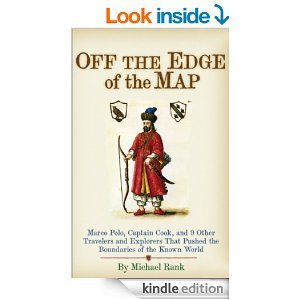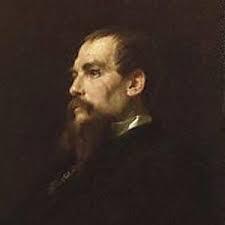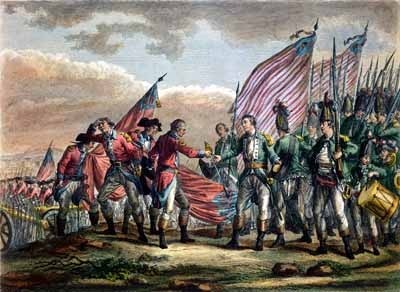Michael Rank's Blog, page 16
March 20, 2014
New Book ‘Off the Edge of the Map’ Has Launched!
 My new book on history’s greatest travelers and explorers has launched! You can get it by clicking here.
My new book on history’s greatest travelers and explorers has launched! You can get it by clicking here.
Synopsis:
From the #1 bestselling author of History’s Greatest Generals comes an exciting new paperback book on the greatest explorers in history and how their discoveries shaped the modern world
Whether it is Rabban Bar Sauma, the 13th-century Chinese monk commissioned by the Mongols to travel West form a military alliance against the Islam; Marco Polo, who opened a window to the East for Europe; or Captain James Cook, whose maritime voyages of discovery created the global economy of the 21st century, each of these explorers had an indelible impact on the modern world.
This book will look at the 11 greatest explorers in history. Some travelled for religious piety, such as Ibn Battuta, who travelled from North Africa to Indonesia in the 1300s, visiting every Islamic pilgrimage site between — and becoming counselor to over 30 heads of state. Others travelled for profit, such as Ferdinand Magellan, who wanted to consolidate Spain’s holdings on the spice trade. Still others travelled for discovery, such as Ernest Shackleton, who led two dozen men to the bottom of the world in an attempt to cross Antarctica on foot.
Whatever their reason for discovery, these explorers still inspire us today to push the limits of human achievement — and discover something about ourselves in the process.
March 17, 2014
HFM 061 | Explorers that Pushed the Boundaries of the Known World, Part 4:Richard Francis Burton (1821-1890) – Spy, Soldier, Linguist, Swordsman, Secret Pilgrim to Mecca
 Richard Francis Burton — sword fighter, explorer, learner of 29 languages, is quite possibly the real life World’s Most Interesting Man. Learn the many fascinating exploits of this Victorian traveler.
Richard Francis Burton — sword fighter, explorer, learner of 29 languages, is quite possibly the real life World’s Most Interesting Man. Learn the many fascinating exploits of this Victorian traveler.
Like this podcast?
March 9, 2014
HFM 060 | Explorers that Pushed the Boundaries of the Known World, Part 3: Ferdinand Magellan (1480-1521) – The Portuguese Navigator’s Terrifying Voyage Across an Endless Sea
[image error]Everyone knows that Magellan’s circumnavigation of the globe was hard, but they don’t know how hard. Nor do they realize how tragic and unnecessary his death was. Learn more about the explorer that boldly ventured into an ocean that took 95 days longer to cross than his original estimate of 3.
Like this podcast?
March 3, 2014
HFM 059 | Explorers that Pushed the Boundaries of the Known World, Part 2: Admiral Ming Zheng He, China’s Master of the Seas (1371-1433)
 What would have happened if China discovered America before Europe? More importantly, what would have happened if it colonized America? We can’t know, but what we do know is that China discovered much of the world at the high of its naval power 600 years, a full century before Europe.
What would have happened if China discovered America before Europe? More importantly, what would have happened if it colonized America? We can’t know, but what we do know is that China discovered much of the world at the high of its naval power 600 years, a full century before Europe.
Like this podcast?
February 23, 2014
HFM 058 | Explorers that Pushed the Boundaries of the Known World, Part 1: Marco Polo – Opening Europe’s Window to the East
Marco Polo in Mongolian Dress
Marco Polo is more than a game you play at the YMCA pool — he spent 20 years traveling throughout the farthest domains of the Mongolian Empire, wrote a best-selling travel account, and permanently altered Europe’s mental map of the world. Find out in this episode how he helped usher in the Age of Exploration two centuries later.
Like this podcast?
February 17, 2014
HFM 057 | Dark Ages in History, Part 3: Europe’s Collapse in 476 AD – And its Rise that Happened Much Sooner than the 1500s
[image error]We all know that the Dark Ages in Europe began after the fall of Rome and continued until the Renaissance in the 1400-1500s. But what if what we all know is all wrong? Find out when, how, and why the European dark ages began, and why it was much different than we expect, and much shorter than we think.
Like this podcast?
February 9, 2014
HFM 056 | Dark Ages in History, Part 2: England’s Anglo-Saxon Invasion in the 6th Century… and the Rise of the Irish
[image error]England fell apart in the fourth century after the Roman withdrawal and the Anglo-Saxon invasion. They managed to put the pieces back together four hundred years later. Who helped them? Believe it or not, the Irish!
Click here to read Thomas Cahill’s book on this top, “How the Irish Saved Civilization.”
Like this podcast?
February 3, 2014
HFM 055 | Dark Ages in History, Part 1: 1177 B.C. and the Late Bronze Age Collapse
 Did you know there was a Dark Ages before the Dark Ages? There was such an event in 1177 BC, and it was so monumental that it inspired Homer’s ‘The Iliad’
Did you know there was a Dark Ages before the Dark Ages? There was such an event in 1177 BC, and it was so monumental that it inspired Homer’s ‘The Iliad’
Like this podcast?
Click here to subscribe to the podcast via iTunes
Click here to check out Eric Cline’s book “1177: The Year Civilization Collapsed”
January 27, 2014
HFM 054 | United We Stand? How Many Americans Actually Fought In – Or Even Cared About – The Revolutionary War?
 Did all Americans fight for the cause of liberty in the American Revolution, or was it a war of few, or even the 1%. In other words, did the common man really care whether they were a British subject?
Did all Americans fight for the cause of liberty in the American Revolution, or was it a war of few, or even the 1%. In other words, did the common man really care whether they were a British subject?
Like this podcast?
Click here to subscribe to the podcast via iTunes
Recommended Resources:
John Adams HBO miniseries on DVD. This miniseries does a great job of depicting all the differing ideologies that made the Revolutionary War and the creation of the United States such a difficult task.
January 20, 2014
HFM 053 | The Republic of the Mediterranean – Why a Coastal Frenchman and Moroccan Have More in Common with Each Other Than Their Countrymen
 The Mediterranean Sea did far more to connect people in history than it did to separate them. After all, they were united by olive oil, wine, and plenty of piracy.
The Mediterranean Sea did far more to connect people in history than it did to separate them. After all, they were united by olive oil, wine, and plenty of piracy.
Like this podcast?



